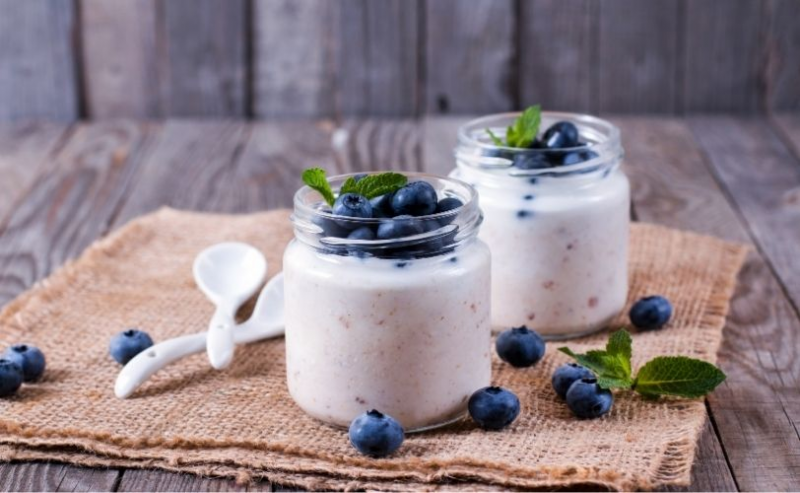5 probiotic foods to look after your gut health
Look after your gut and sure enough, it will look after you!

Something I talk about a lot about is gut/digestive health; what damages it, what nourishes it, the vast amount of roles our gut and the microbiome (the bacteria in our gut) play in numerous functions, and the massive links between gut health, symptoms and chronic diseases.
In short, if you want to be in optimal health you need to support your gut and all of its amazing inhabitants, they help determine how well your immune system works, how efficiently you absorb nutrients, how good of a mood you're in, how easily you store fat and a number of other factors we don’t necessarily associate with digestion.
How to support healthy bacteria
One way we can support levels of good bacteria in the gut is to eat plenty of probiotic and prebiotic foods; prebiotics are just as, if not more, important as probiotics as they feed the good guys. Keeping them happy and well fuelled is a priority, so try getting in plenty of prebiotic-rich veg daily such as leeks, onions, asparagus, garlic, artichokes, and starchy veg like sweet potato and squash.
For this particular post, I want to focus on probiotic foods; there is more to explore than yoghurt and the greater variety the better! To give you an idea of how you can get in more of these healing, tummy-loving foods, here are my top five sources below, plus a helping hand on how you can start having a go at D.I.Y ferments.
1. Sauerkraut/Kimchi
Or really any type of fermented vegetable you can buy, or make ones that use carrots or beets. As well as beneficial bacteria, the fermentation process ramps up the nutritional value in other ways, providing us with vitamin B for example. If you have issues digesting certain veg raw such as cabbage, fermentation can also make this easier.
I love sauerkraut because of how effortlessly I can include it in meals every day; mixed into salads, rolled into wraps, topping homemade burgers as a nutritious slaw replacement, or just as a side with any protein and veg - no special recipe required.

When buying be sure to get it from the refrigerated section and labelled as raw, but if you don’t fancy buying, as many of the fermented foods can be a little pricey, you can always have a go at making it. Once you have a good jar it's incredibly cheap with cabbage and salt being all you really need... that and some patience as it can take a few weeks to be ready.
2) Kombucha
A healthy refreshing fizzy drink that promotes health, yes please! You can pour it over ice if you’re feeling extra fancy. The zingy flavour can be a little overpowering for some but if you're buying it there are so many flavours to choose from now; from fruity sweet berries to ginger and lime. The main components of this though are green tea and sugar that have been fermented to provide the probiotic content.
To make your own you can buy what is called a SCOBY on Amazon (symbiotic culture of bacteria and yeast) to add to sweetened and cooled green tea. Most come with instructions to follow, I use the Happy Kombucha Company for example.
3) Kefir
Another drink to try if you're not a fan of the strong fizz is kefir, which you can make or buy as water kefir or milk kefir. If dairy doesn't work for you, coconut milk or coconut water kefir is brilliant, plus you get some bonus healthy fats.
Alternatively, you can invest in some water or milk kefir grains for a money-saving option in the long term. Both kombucha and kefir are super easy to make and master, but kefir will take less time overall.
4) Apple cider vinegar
Another easy to incorporate fermented food is apple cider vinegar, as long as you look for a brand that is labelled as ‘raw’ or ‘unpasteurised’ - it may also say ‘with the mother’ and this refers to the sediment you can see at the bottom of the bottle. I wouldn't use this as the only source of fermented food in your diet as it lacks the same beneficial bacteria in the fermented veg, kefir or kombucha, but a brilliant digestive aid nonetheless.
I add a tablespoon to warm lemon water every morning to kick start the day. If the acid on teeth is a concern, try a stainless steel straw.

5) Organic yoghurt and coconut/nut milk yoghurt
Lastly, the most well known and popular source of probiotics: yoghurt, but bear in mind that not all yoghurts are are created equal. Yoghurt drinks advertised to boost tummy health usually come with added sugar, sweeteners or other additives, and are best avoided. Dairy is something I strongly recommend you buy organic and check the ingredient label for those added cultures. There are now a variety of great quality and totally delicious coconut or nut milk yoghurts, such as Coyo or the Coconut Collaborative.
Generally, yoghurt will have fewer strains of beneficial bacteria than the above options so try to aim for another source on top of it.
Fermented foods at home
I hope this inspires you to experiment with a variety of fermented foods, here are some last take away points:
- A variety is better - the more probiotic foods, the more diversity of bacterial strains.
- Homemade is cheaper and will generally guarantee a higher amount of probiotics, plus you know exactly what is in there.
- Homemade also takes some patience so plan ahead for when you want it.
- Probiotic foods can easily be incorporated into everyday meals and drinks.

Find a nutritionist dealing with Healthy eating
All nutrition professionals are verified





